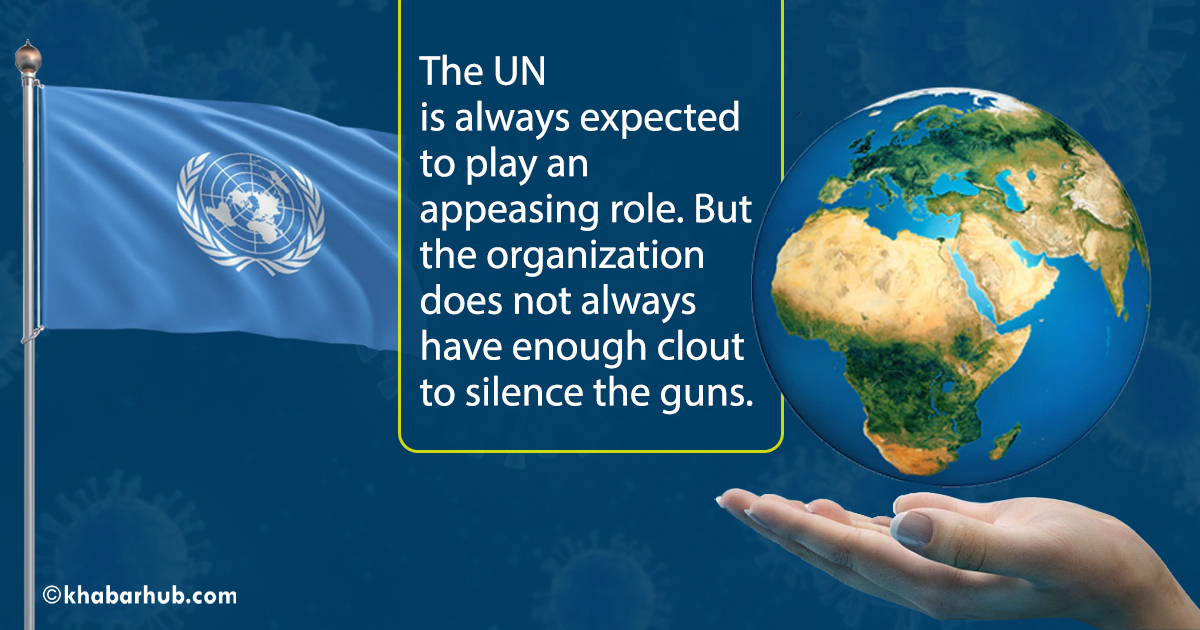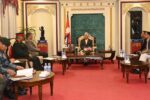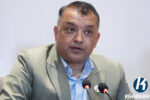To begin with, let me go into the anxiousness elevated by the UN Secretary-General, “COVID-19 is the greatest test” since World War II; “it is more than a health crisis. It is a human crisis.”
In this context, the top UN chair emphasizes the absolute actions for countries to act in concert and outlines ways to defeat the outbreak and deadly spread of the virus, safeguard people’s lives and their livelihoods, and learn from the crisis to build back.
In addition, the World Health Organization (WHO) – the global authority to coordinate the health issues on the UN’s response – and the UN Office for the Coordination of Humanitarian Affairs (OCHA) organized a humanitarian appeal for the most vulnerable countries, bringing together existing appeals from UN partners, as well as identifying new needs.
We must prepare for the worst by gathering the experience from recent epidemic and pandemic crisis issues and do everything that we can to protect human health at any cost and by any means.
It is evident that wherever peace and security are under threat. The UN is always expected to play an appeasing role. But the organization does not always have enough clout to silence the guns.
For all the criticism, it is beyond clear whether the UN could have prevented the slaughter or bow down its head to the big powers.
As a result, over the years the UN was unable to help bring stability in places like Afghanistan, Myanmar’s Rakhine State, Eastern Ukraine or between Israel and Palestine, to name just a few trouble spots where humanity is now underdrawn, basic facilities hardly be found for some specific groups of people, broken and biased health facility creating questions continuously.
In the last two cases, disagreements in the Security Council help perpetuate current deadlocks. On top of this, in 2018 the UN refugee agency in the Occupied Palestine Territories (known as UNRWA) faced an unprecedented financial crisis after the U.S. cut its $300 million contributions.
Following the recent past and opinion from the experts revealed that the UN strongly wanted to reduce criticism of Myanmar and was hamstrung by China, Russia opposition to the concrete reaction.
The UN has been dogged for years by uncomfortable and unyielding questions on its conception and future strategy to the Rohingya Community.
For all the criticism, it is beyond clear whether the UN could have prevented the slaughter or bow down its head to the big powers.
Here the major concerning issue and obstacle for the UN is that the opposite side where both China and Russia, who have strong alignment with Myanmar, giving vetoes in the Security Council.
Through the approach of UN body to Myanmar government, it is evident and mirrored that the diplomatic community was blinded by the popularity and reputation of Aung San Suu Kyi, who is a former dissident and claimed her as an icon of peacekeeper or freedom and became the country’s de-facto leader in 2016.
There are signs that the UN is changing its strategy and diplomatic approach to the countries which are facing several identity crises.
The UN can also take some credit for forcing North Korea into the negotiating table. In June 2018, the summit in Singapore between the country’s leader Kim Jong-un and U.S. President Donald Trump came at the back of the harshest sanctions the UN Security Council has ever imposed on the Asian country.
By emphasizing human security, in the Middle East, the traditional method of peacekeeping and spreading freedom has now transformed into a strategy that also pursues to work towards regional security.
Moreover, an unusual visit in December 2017 by the then UN political chief to North Korea paved the way for the easing of tensions.
Although it is Africa where most of the UN peace and security work focus. With volatility reigning in countries like Libya, Mali, South Sudan, Somalia, the Central African Republic and the Democratic Republic of the Congo, the continent hosts seven of the current fourteen UN peacekeeping missions.
Somehow naively, the UN is always expected to resolve the most pressing crises that erupt around the world. As we have seen, the reality is very different. And 2020 is not an exception.
The crucial point of the matter is that it is better to have the UN in whatever capacity is conceivable than not have the UN at all.
Utilizing the Middle East as a broad and innovative case study permits for a conceptual framework for how the UN operationalizes security.
By emphasizing human security, in the Middle East, the traditional method of peacekeeping and spreading freedom has now transformed into a strategy that also pursues to work towards regional security.
This reframing has resulted in the UN supplying developmental and humanitarian aid in various ways.
Though there are many examples in the Middle East that would support this development. Based on that examples, instability has paved the way for foreign involvement and manipulation and it could eventually generate more instability.
Most importantly, the situations taking place in the Middle East create a social exclusion or marginalized populations, which both can provide grounds for an increase in violent extremism.
This type of situation can enable more possibility to raise crisis issues which may create a negative impact on the people who are left behind and treated as vulnerable in the existing environment.
To move forward by addressing the scenario in the Middle East, the UN strongly argues about the united nature across every ethnic and religious line.
By analyzing the facts, it is apparent that the UN has to continue the support and guidance of the international community in order to continue its humanitarian and protective missions in the Middle East.
Failing to garner the support of the international community could prove to be detrimental to the security of the Middle East in the coming years.
The UN is the most significant and universal forum available till now and 192 states have its membership; and based on previous cases, it’s definitely possible for the UN to promote international cooperation and conferring legitimacy to such efforts and actions.
The UN has, for sixty-two years, continuously provided humanitarian support and assistance to regions in need and acted as a forum for global dialogue where international consensus could be reached on matters of significance.
The global landscape for policymakers and practitioners already has been changed by series of long-term trends, from climate change to demographics plus COVID-19 pandemic, just as they set their sights on implementing the Global 2030 Agenda of Sustainable Development Goals.
Besides, the result of slow downing in emerging market economies, migration, changing employment patterns, and consequences of fragile states and societies — ranging from public health crises to terrorism — will all impact in one single area of discussion on how the SDGs can be implemented.
The gravity of these challenges cannot be underestimated rather the UN must work hard taking advantage of its multi-stakeholder approach to overcome.
It fosters the ethos of coexistence and tolerance by the continued process of dialogue that our times ultimate demand.
It is my firm belief that this will give birth to a new era of changing mindset as well as a “culture of peace”—the beginning of which signifies a critical transition in human history. The advancing processes of globalization worldwide have been accompanied by deepening divisions and conflicts—both within and between societies.
Now it’s common to see around us a spreading “culture of war” that validates the practice of war and violent means to realize preferred ends.
UN will work persistently toward the creation of a truly peaceful global society in which there is genuine respect for differences of position and outlook and where there is a shared reverence for the human dignity of all.
No matter how impossible a deadlock may seem, a breakthrough can always be found if we meet face-to-face and engage in genuine dialogue.
This points to the urgent need to move proactively to the next step of rebuilding a stable and peaceful order in the region.
All parties will work through the UN to develop new channels for dialogue that will substantively further this process.
It is essential we remember that the core strength of the UN is its “soft power,” the power of dialogue and international cooperation. This is true even in the field of global peace and security.
Although it sounds very harsh and feels disappointed the world is still dominated by ruthless and unjustifiable competition for advantage with no thought given to the price paid by others.
While the UN Charter undoubtedly recognizes the prospect of the exercise of “hard power,” including military action, Chapter VI, on the pacific settlement of disputes, details those actions which are to be taken before the application of the enforcement measures set out in Chapter VII.
With the use of hard power reserved for emergency circumstances as a means of last resort, precedence is thus firmly placed on Chapter VI.
The core purpose of the UN is to be the parliament of humanity, a venue where all voices can be heard and all perspectives represented.
However seriously national interests clash and crises deepen, it is believed that the answer lies in the commitment to a relentless process of dialogue, steadily creating the foundations for common efforts to resolve the challenges that face us.
If such humanitarian competition—a competition for extended influence based on soft power—firmly takes root, we will see the last of conventional zero-sum competition in which winners prevail through the victimization and suffering of losers.
This practice will open a pathway for a win-win era where the dignity of everyone on the globe is honored, with each country competing meaningfully and constructively to make the greatest contribution to humanity.
Although it sounds very harsh and feels disappointed the world is still dominated by ruthless and unjustifiable competition for advantage with no thought given to the price paid by others.
It has been made for steadily growing gaps between the rich and the poor by similar types of competition, played out on an ever-expanding global scale.
Moreover, as threats to human dignity—the crisis of the global environment is emblematic—become borderless, we need to bear in mind that no individual state acting in isolation can mount a truly effective response to what former UN Secretary-General Kofi Annan expressed this reality succinctly.
Markedly, overdue payment of assessed and pledged contributions undermines the UN’s capacities, to a great extent.
Even, financial restrictions often prevent it from engaging in urgent programming for the cause of welfare.
To help resolve the UN’s long-term challenge of securing stable sources of funding, a separate framework, parallel to the contributions of member states, might be initiated to solicit direct support from the world’s citizens.
Securing a stable and justified budget is essential if the UN is to fulfill its duties effectively to respond to global issues.
(Dr. Mohammad Tarikul Islam is an Associate Professor of Government and Politics at Jahangirnagar University in Bangladesh)









Comment